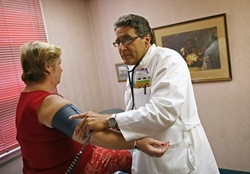Your General Practitioner
General practitioners are key players in the provision of breast cancer services as well as in the assessment and treatment of benign breast conditions. Women look to their GPs for guidance and recommendations on secondary referrals, and as a source of ongoing support. 2/3 surgical referrals for suspected breast cancer come from GPs. As there is evidence that breast cancer patients treated by specialist breast surgeons have better outcomes, and that long term survival prospects are enhanced by the delivery of breast cancer care in a multidisciplinary team setting, GPs are therefore in a position to influence breast cancer outcomes through their referral patterns.
GPs are important providers of breast care as they are the first point of contact for a woman with a breast symptom. Although a large proportion of these women will have benign conditions, prompt definitive diagnosis of all breast conditions is essential, so that breast cancers are not missed and benign problems are not over treated or the source of undue anxiety. Women with a family history of breast cancer ask their GPs for advice regarding surveillance. All patients diagnosed with breast cancer via Breastscreen Victoria are advised to see their GP for further discussion of the diagnosis and onward referral for treatment.
GPs also have an important role to play in the ongoing monitoring and support of women following treatment for breast cancer, very often knowing patients and their families very well over a period of many years. They are in an excellent position to provide useful additional information to patients as well as to reinforce the information given by specialists. They can aid in preparation of the patient for treatment and act as a source of support to the whole family. Your GP can also be of assistance if you would like to obtain a second opinion. A lot of women, especially younger patients, are in excellent general health at the time of diagnosis of breast cancer, and many may not have a regular GP. It is important that you have a GP in this circumstance. When seeking out a new GP, there’s still no substitute for the old-fashioned method of asking people you know and trust — starting with your family, friends and perhaps your gynaecologist.
Care Plans and Multi-disciplinary Case Conferencing
GPs are central in care co-ordination. This role is historically recognised by Medicare, with GP referrals required for patients to receive benefits for specialist accounts. In 2000 Commonwealth Department Health and Aged Care introduced Enhanced Primary Care (EPC) Medicare item numbers for which the GP is eligible to claim (MBS item numbers 729 and 759) for care planning and case conferencing for people of any age with chronic conditions and multi-disciplinary care needs.
 Care plans (MBS item no 729) involve the GP + two other formal care providers of different disciplines (eg breast surgeon, breast care nurse) in a comprehensive assessment of the needs and management goals with arrangements for implementation by all parties, and a planned review date. Multi-disciplinary case conferences (MBS item no 759) involve the GP + 2 or more other formal care providers, at least one non-medical eg breast care nurse, with all parties present in person or teleconference.
Care plans (MBS item no 729) involve the GP + two other formal care providers of different disciplines (eg breast surgeon, breast care nurse) in a comprehensive assessment of the needs and management goals with arrangements for implementation by all parties, and a planned review date. Multi-disciplinary case conferences (MBS item no 759) involve the GP + 2 or more other formal care providers, at least one non-medical eg breast care nurse, with all parties present in person or teleconference.
We are keen to develop and maintain close ties with patients’ general practitioners, and encourage their ongoing active involvement their patients’ breast cancer care. We offer the GP of all patients undergoing surgery for breast cancer the opportunity to participate in a post operative telephone case conference and to contribute to the patient’s multidisciplinary care plan.











